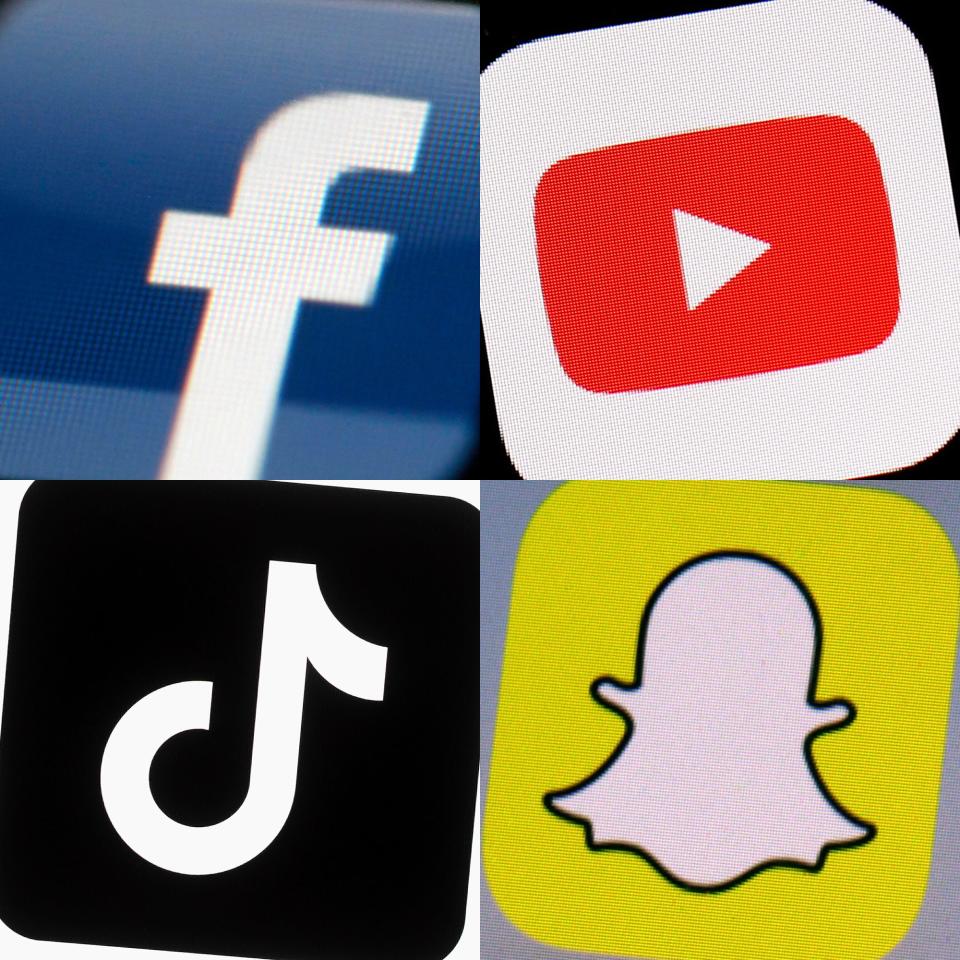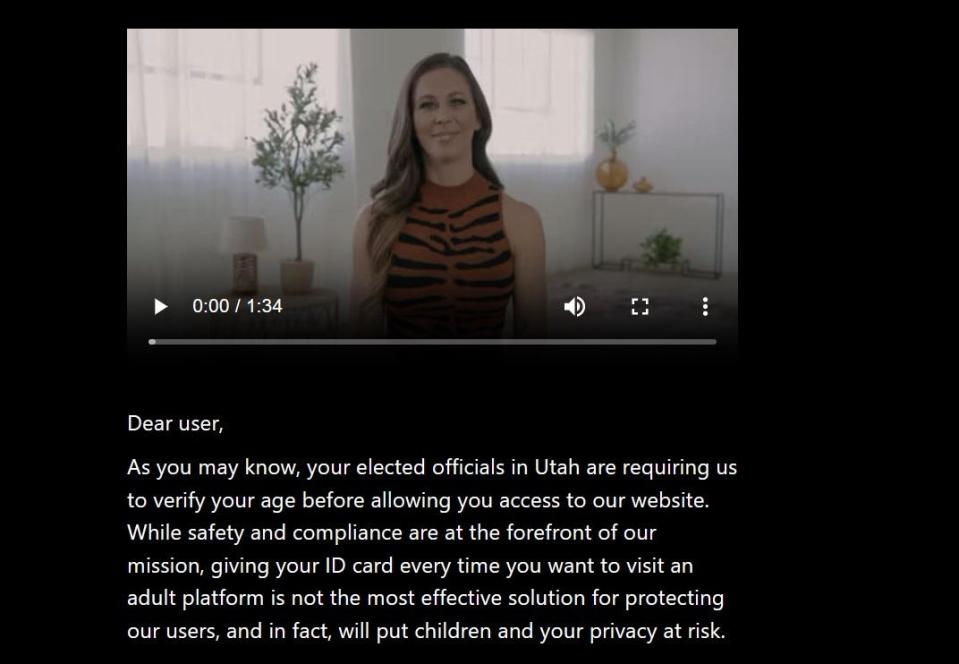Florida House passes social media minor ban, age verification requirement for porn sites
Just two and a half weeks into Florida’s legislative session, the House of Representatives has passed two of its leadership’s priority bills, making big changes to how people access social media and pornographic sites.
One of those (HB 1) would ban social media platforms for Florida minors younger than 16. The other (HB 3) would require age verification to access pornographic websites.
Both need to pass the Senate before making it to Gov. Ron DeSantis’ desk. And both, if the governor signs them and they withstand likely legal challenges, would go into effect in July.
The bills happened to pass the chamber on the same day that the city of New York officially designated social media an "environmental toxin," saying "all New Yorkers should advocate to hold social media companies accountable and advance reform that protects youth from harmful and predatory practices."
Florida House members approved the pornographic legislation unanimously on Wednesday. But the social media legislation faced more pushback.
Opponents said they shared the bill sponsors’ concerns regarding negative effects of social media on minor's mental health. But they also worried the bill went too far to try to fix it, not allowing exemptions for parental permission, snuffing out the positive effects and potentially running afoul of the U.S. Constitution.
Despite that, the bill only got 13 votes in opposition, all from Democrats.

Legal concerns, parental rights questions raised
Bill sponsor Fiona McFarland, R-Sarasota, called social media “digital fentanyl.”
“Social media companies themselves know how addictive their technology is, and they’re even unable to police the bad guys,” McFarland said on the House floor before the vote. “Despite their best efforts, content about human trafficking and child pornography keep slipping into the algorithm.”
She said law enforcement representatives had asked for the measure, who “see all of the threats, the bullying, the crime, that is happening on social media.”
“This legislation would be far better served to be done at the federal level,” said McFarland, a mother of three. “But I cannot wait for others to act when I have a tool at my disposal to protect our teens and Florida’s future.”
That tool would require those making new accounts to prove they’re old enough through a third-party age verification process. Existing accounts will be deleted if they’re “reasonably known” to be held by someone younger than 16 years old.
And that’s without a parental permission exception, which was frequently pointed out by bill opponents.
In the name of parental rights, GOP lawmakers in recent years have passed a slew of controversial policies affecting minors. Classroom instruction on gender identity and sexual orientation has been restricted. Thousands of books have been removed, some pending review and others permanently, from school shelves across the state. And private school voucher programs have been dramatically expanded.
“Allowing parents to have the ability to make decisions on how they parent their child is the reason we passed (the voucher expansion bill) last year. It’s the reason we passed so many bills,” said Rep. Ashley Gantt, D-Miami, who voted against the bill. "In this bill, we’re saying parents have no ability at all to make the ultimate decision.”
On Tuesday, lawmakers shot down an amendment filed by Gantt that would have allowed for a parental permission exception for those younger than 18 years old.
Multiple other states have passed similar laws to the one the House just approved – but they’ve had parental rights exceptions. And that hasn’t been enough to protect them against legal challenges.
A 2023 law in Arkansas has been temporarily blocked by a federal judge amid First Amendment concerns. The same happened earlier this month for a new Ohio law.
“I’m not opposed to controls as it relates to social media,” said Rep. Mike Gottlieb, D-Davie, who also voted against the measure. “However, what I am opposed to is the very broad brush that we’re utilizing here in a constitutional scheme.”
He said the bill stepped on minors’ First Amendment rights: “What we have to do is put in guardrails, not a wall, and the bill goes a step too far in my opinion.”
Democrats also said the bill would affect children's entrepreneurship and creativity, as well as the use of social media to find mental health help and supportive communities, such as for those who are LGBTQ.
Not all, though, were opposed, with only 13 of the House's 36 Democrats voting against the bill. And Rep. Michele Rayner, D-St. Petersburg, one of the more progressive members of the House, is a bill sponsor.
Rayner said social media companies were making profit “off the backs of our children.”
“They don’t care, and they know that they are,” Rayner said. “These companies are aware of their addictive design and deceptive patterns.”
DeSantis’ office has not responded to questions about his position on the measures. During a press conference after the vote, House Speaker Paul Renner, R-Palm Coast, said he had not “talked to (DeSantis) specifically on this topic yet.”
But he said they’re working “very closely” with the Senate on the bill, and that there’s “not any disagreement on where the bill’s headed.”
Which social media platforms?
While the bill has passed the House, its backers have refused to name the social media platforms the legislation would affect, despite repeated questioning from Democratic lawmakers.
Lawmakers had approved an amendment Tuesday that narrowed the definition of social media platforms falling under its language. They must, in part, use "addictive, harmful, or deceptive design features, or any other feature that is designed to cause an account holder to have an excessive or compulsive need to use or engage with the social media platform."
Renner said on Wednesday that the bill didn’t target content, but rather the “addictive technologies.”
“So it would be inappropriate for us to target a company by name,” he said. “Because we defined it tightly … it’s not going to be infringing on the First Amendment.”
Renner said affected companies could make a “kid-safe platform” by not being "addictive" that would not fall under the bill's language. But when asked what’s considered “addictive," he said “the courts will decide.”
Meta, which opposes the bill and is the owner of Facebook and Instagram, said something similar. In a press conference Wednesday morning, company executives said their platform didn't have addictive features.
Caulder Harvill-Childs, public policy manager in the Southeast for Meta, said the amendment language muddies the waters on which platforms the bill applies to, and a judge would likely have to decide.
Lawmakers not naming affected platforms: Florida lawmakers want to ban social media platforms for kids — but won't say which ones
House speaker priority bills: Florida House leader pushes social media restrictions, porn viewer age verification

The porn policy
Meantime, Rep. Toby Overdorf, R-Palm City, a sponsor of the porn age verification bill, said it was a “yes” for innocence.
“Members, when you live in a world where there is a trending downward age of children for the first time seeing hardcore pornography,” he said. “When young girls are believing that they have to look a certain way just to be desirable, and young boys believe they have to behave aggressively just to be desirable, members, it’s time to take a stand for our children.
“Let kids be kids.”
The bill would require porn websites to use a third party to make sure viewers are at least 18 years old. Submitted information can be held “any longer than is reasonably necessary to verify the age of the person," according to its language.
Despite that, and despite the unanimous support among House members, concerns linger.
Eight states have passed pornographic age verification laws, according to the National Decency Coalition. But the rollout hasn't been smooth.
It's beset by litigation largely centered around First Amendment concerns. And some porn sites have simply blocked access to their websites rather than implement age verification measures, citing privacy concerns because of the personal identifying information involved. Others simply haven’t implemented them.
In a statement emailed to the USA TODAY Network-Florida, PornHub – the most popular pornographic website in the world – declined to say how it would respond if the legislation becomes law.
But it did have strong opinions against it.
“Any regulations that require hundreds of thousands of adult sites to collect significant amounts of highly sensitive personal information is putting user safety in jeopardy,” wrote a spokesperson for Aylo, its parent company. “Moreover, as experience has demonstrated, unless properly enforced, users will simply access non-compliant sites or find other methods of evading these laws.”
The company pointed to how the website had lost approximately 80% of its traffic in Louisiana after the state passed a similar law.
“These people did not stop looking for porn,” the statement continued. “They just migrated to darker corners of the internet that don't ask users to verify age, that don't follow the law, that don't take user safety seriously, and that often don't even moderate content.”
PornHub outright blocked access to its website in multiple states. The company said the “only” solution is to require “age verification at the source: on the device.”
This reporting content is supported by a partnership with Freedom Forum and Journalism Funding Partners. USA Today Network-Florida First Amendment reporter Douglas Soule is based in Tallahassee, Fla. He can be reached at DSoule@gannett.com. On X: @DouglasSoule.
This article originally appeared on Tallahassee Democrat: Florida House OKs ban on social media for kids, porn age verification

